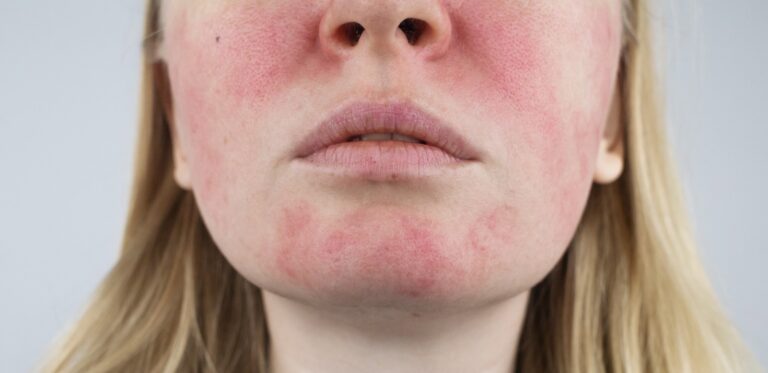Rosacea is a skin condition that causes flushing or blushing of the face. It can be caused or worsened by many different factors, including, in some people, allergies.
Rosacea Basics

Rosacea is a common condition, with an estimated worldwide incidence of higher than 5% of the total population. While rosacea can affect anyone, certain people are more affected, including:
- Adults between the ages of 30-50
- Women
- People with fair skin tones
In addition to flushing, symptoms of rosacea can include:
- Swollen bumps that resemble acne
- Skin that feels hot and tender
- Visible spider veins on the face
- Dry, irritated eyes
Research on Rosacea and Allergies
Studies have pointed to a link between rosacea and allergies:
- A survey from the National Rosacea Society found that out of 832 patients polled, 32% reported that they experienced rosacea flare-ups when they experienced an allergic reaction.
- An additional study published in 2015 found that rosacea patients were 4.6 times more likely to have airborne allergies and ten times more likely to have food allergies than those without rosacea.
Why The Connection?
When you have an allergic reaction, it triggers a variety of symptoms, including nasal congestion, runny nose and itchy eyes. Some people also experience flushing when their allergies act up. This flushing can then trigger your rosacea symptoms.
Limit Exposure to Your Allergy Triggers
If you’ve noticed that your rosacea seems to flare up at the same time as your allergy symptoms, one of the best things you can do is limit exposure to your allergens. Depending on what you are allergic to, this may look like:
- Avoiding consuming or coming into contact with foods you are allergic to.
- Checking local pollen levels in Charleston and avoiding outdoor areas like Hampton Park when levels are high.
- Keeping the windows of your home and car closed.
- Regularly vacuuming and dusting your home.
- Washing your bedding in hot water once a week.
- Using a dehumidifier to prevent mold growth.
If you are unsure of what your particular allergens are, consider making an appointment with an allergist. They can go over your symptoms, including when they seem to worsen and perform allergy testing to help identify your triggers.
Additionally, they may recommend treatments like prescription medication or immunotherapy to help you manage your allergies. Getting your allergies under control may also help to limit your rosacea flare-ups.
To learn more or to schedule an appointment with one of our specialists, call Charleston ENT & Allergy today.
